 Technology peripherals
Technology peripherals
 AI
AI
 Study shows ChatGPT won't give OpenAI a sustained first-mover advantage
Study shows ChatGPT won't give OpenAI a sustained first-mover advantage
Study shows ChatGPT won't give OpenAI a sustained first-mover advantage
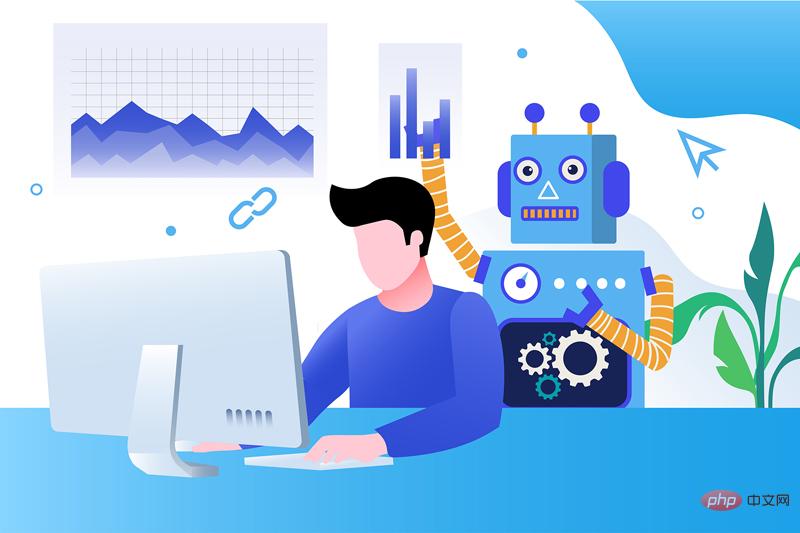
ChatGPT developed by OpenAI has become popular all over the world. But in the opinion of industry experts, although the marketing hype surrounding ChatGPT is reasonable, they do not believe that OpenAI can dominate the artificial intelligence market with its first-mover advantage. Instead, success in the market will depend directly on the quality and quantity of data a tech company has, as well as the computing power it needs to run its systems. The market is unlikely to be a winner-take-all situation and is likely to develop in a more fragmented manner than cloud computing.
This article will reveal why people are excited about ChatGPT and discuss why OpenAI’s early entry into the industry may not bring sustained first-mover advantages. Industry media and CUBE collaborator Sarbjeet Johal and SiliconANGLE Media video studio CUBE co-host John Furrier analyzed and discussed this.
The infinite possibilities of artificial intelligence and natural language processing
For those who have not used ChatGPT, the functions of ChatGPT are amazing. One of its exciting use cases is from Sam Charrington of the This Week in ML podcast. Brian Gracely did this on his Cloudcast podcast, using ChatGPT for an episode titled "Will ChatGPT replace my job?"
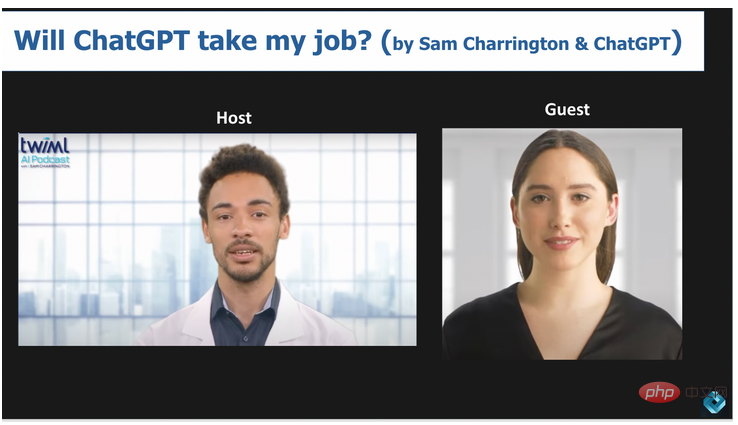
What Sam Charrington did was interview ChatGPT using ChatGPT, he just gave the system prompts. ChatGPT automatically generates questions, which Sam then feeds into ChatGPT to generate answers. He then fed the questions and answers into the avatar builder pictured above and sped it up twice so it sounded human-like, which is truly amazing.
Industry media first asked John Furrier whether ChatGPT would replace humans as CUBE moderators and sought the opinions of Sarbjeet Johal, then entered their answers into ChatGPT, and ChatGPT returned the results of their answers.
John and Sarbjeet discussed an example of using ChatGPT in the podcast. In this podcast, ChatGPT is prompted to conduct a self-interview, whose responses are fed into an avatar generator and sped up to sound like a conversation between two people.
John said using ChatGPT can provide value for tasks such as writing marketing copy, brainstorming guest lists and answering specific questions. However, he admitted that answers generated by AI are not always 100% accurate and require some editing.
Sarbjeet also mentioned an example of chatting with ChatGPT, which can give detailed answers in the form of a conversation. Therefore, they all believe that although current artificial intelligence models (such as ChatGPT) are democratizing intelligence, they are not yet able to create new intelligence or provide competitive advantages in certain fields.
Will ChatGPT be the era of Netscape?
So what about Amara’s Law proposed by futurist Roy Amara? It will be shown below.
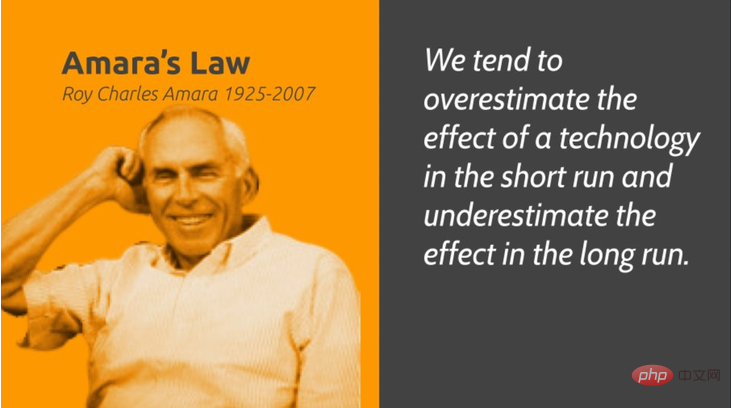
When asking John and Sarbjeet whether ChatGPT also complies with Amara's Law, here is ChatGPT's summary of their answers: John and Sarbjeet discussed Amara The view of the law, which states that "people generally tend to overestimate the impact of technology in the short term and underestimate it in the long term."
Sarbjeet believes this is true for ChatGPT, and people use it The more times they use it and start to see its limitations, the less impressed they become with it. On the other hand, John believes that ChatGPT is a unique and powerful technology that may be underestimated in the short term but will exceed people's expectations in the long term.
He compared it to the early days of the Internet, when the Netscape browser was as childish as a child but later had a huge impact on society. He noted that in the short term, some experts are dismissive of ChatGPT; but in the long term, others see it as a game changer. They all agree that there is some polarization surrounding the ChatGPT hype.
Will OpenAI gain a first-mover advantage from ChatGPT?
Will OpenAI’s early entry into the market give the company a sustained competitive advantage? History suggests it may, But the consensus between John and Sarbjeet is: probably not.
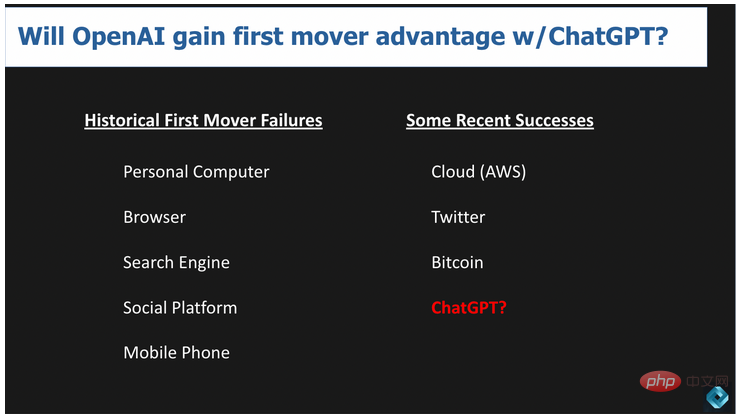
#Throughout the history of the technology industry, there are many cases where pioneers failed. Altair, IBM, Tandy, Commodore and Apple were all technology pioneers, but Dell emerged a few years later with a better business model.
·Netscape became popular in Silicon Valley with its first browser.
·AltaVista is the first search engine to index full text.
·Friendster and MySpace came before Facebook.
·The iPhone was certainly not the first mobile device.
There are many examples of failure, but there are also some successful examples, such as AWS in the cloud computing field, Twitter with the first-mover advantage, and Bitcoin in the cryptocurrency field.
Will OpenAI succeed with ChatGP?
Here is ChatGPT summarizing their answers:
John and Sarbjeet discuss OpenAI’s early entry via ChatGPT Whether the market will give the company a sustainable competitive advantage. They acknowledge that the technology industry is littered with examples of failed pioneers, such as Altair, IBM, Tandy and Commodore in computer games, and Friendster and MySpace in social media.
However, they also mentioned some recent success stories, such as cloud computing provider AWS, Twitter, Bitcoin and smartphones. John believes that OpenAI may not appear on the list of successful pioneers, but the large language model artificial intelligence category they are working on will be successful.
Sarbjeet also believes that OpenAI’s first entry into the market with ChatGPT will not give the company a competitive advantage, because Google has been researching similar technologies and other companies may also participate in the market competition. He also pointed out that ChatGPT is still prone to errors and there are many questions surrounding the origin of its content, so it is a risky move for OpenAI.
Super-scale computers dominate artificial intelligence, will they challenge ChatGPT?
Let’s take a look at some data from enterprise technology research, and you will see that super-scale enterprises Dominance in enterprise artificial intelligence.
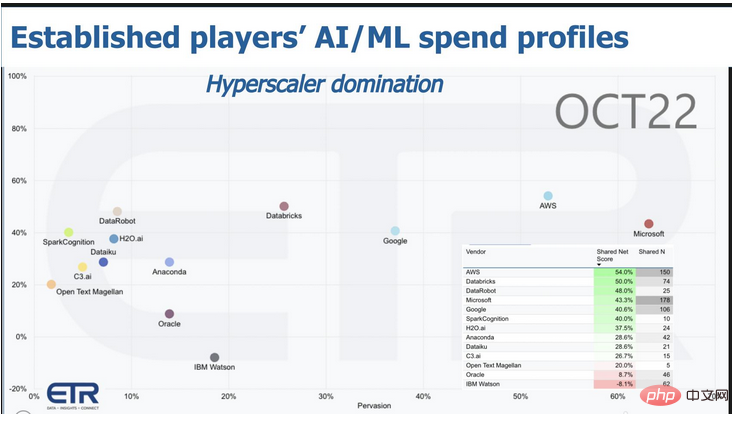
The above graph shows the net score or development trend on the Y-axis, and the penetration rate or market share of the ETR survey on the X-axis.
The most relevant key conclusion is that hyperscalers dominate. Although the world's three largest cloud computing providers can also be seen on some other lists.
Of course, in this market there are experts such as C3.ai, DataRobot, SparkCognition, H2o.ai, Anaconda, Dataiku, as well as Oracle and IBM. But their share among enterprise buyers pales in comparison to the world's three largest cloud computing vendors. Hence this background.
Who will win the conversational AI battle?
The big cloud computing and Internet giants are ready to seize this opportunity. Microsoft has invested up to $10 billion, and Google is obviously investing heavily as well. Of course, there are companies like Apple, Chinchilla, Bloom or Jasper on the market now. At the same time, governments such as the United States, the European Union, and China are paying attention to the development of this field.
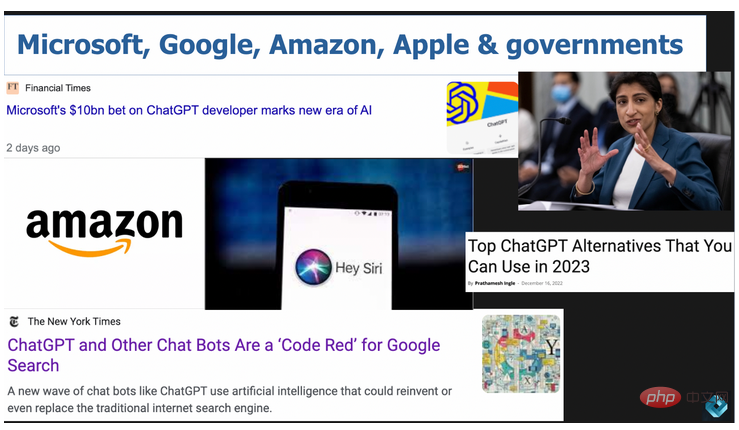
Here is ChatGPT’s summary of the topic:
John and Sarbjeet discussed competition in artificial intelligence and natural language processing, noting that Microsoft and Google Large tech companies like Chinchilla, Bloom and Jasper are also potential competitors. They also pointed out that the speed of technological change is now much faster than in the past, and the development in two years is equivalent to the development in the past 10 years.
Summary:
Will the conversational artificial intelligence demonstrated by ChatGPT have a similar impact on the world? Yes, I believe so. Natural language and conversational interfaces will revolutionize the way people live, work and play. Just as Amazon turned data centers into APIs, this type of technology will turn technology and many tasks into language commands.
Can OpenAI leverage its first-mover advantage to create a sustainable dominance? That’s anyone’s guess, but the panelists’ guess is that it’s unlikely. They point out that there are too many forces at play between the big internet giants, government regulation and the massive investment that will come into the space.
The history of the development of the technology industry shows that a company or companies will emerge that will disrupt the market and dominate, but venture capital firms may also refuse to invest in them because they do not fit the safe investment model.
Maybe someone can crack its password. Regardless, OpenAI has released the genie in the bottle, and there's no chance it's coming back.
The above is the detailed content of Study shows ChatGPT won't give OpenAI a sustained first-mover advantage. For more information, please follow other related articles on the PHP Chinese website!

Hot AI Tools

Undresser.AI Undress
AI-powered app for creating realistic nude photos

AI Clothes Remover
Online AI tool for removing clothes from photos.

Undress AI Tool
Undress images for free

Clothoff.io
AI clothes remover

AI Hentai Generator
Generate AI Hentai for free.

Hot Article

Hot Tools

Notepad++7.3.1
Easy-to-use and free code editor

SublimeText3 Chinese version
Chinese version, very easy to use

Zend Studio 13.0.1
Powerful PHP integrated development environment

Dreamweaver CS6
Visual web development tools

SublimeText3 Mac version
God-level code editing software (SublimeText3)

Hot Topics
 ChatGPT now allows free users to generate images by using DALL-E 3 with a daily limit
Aug 09, 2024 pm 09:37 PM
ChatGPT now allows free users to generate images by using DALL-E 3 with a daily limit
Aug 09, 2024 pm 09:37 PM
DALL-E 3 was officially introduced in September of 2023 as a vastly improved model than its predecessor. It is considered one of the best AI image generators to date, capable of creating images with intricate detail. However, at launch, it was exclus
 Bytedance Cutting launches SVIP super membership: 499 yuan for continuous annual subscription, providing a variety of AI functions
Jun 28, 2024 am 03:51 AM
Bytedance Cutting launches SVIP super membership: 499 yuan for continuous annual subscription, providing a variety of AI functions
Jun 28, 2024 am 03:51 AM
This site reported on June 27 that Jianying is a video editing software developed by FaceMeng Technology, a subsidiary of ByteDance. It relies on the Douyin platform and basically produces short video content for users of the platform. It is compatible with iOS, Android, and Windows. , MacOS and other operating systems. Jianying officially announced the upgrade of its membership system and launched a new SVIP, which includes a variety of AI black technologies, such as intelligent translation, intelligent highlighting, intelligent packaging, digital human synthesis, etc. In terms of price, the monthly fee for clipping SVIP is 79 yuan, the annual fee is 599 yuan (note on this site: equivalent to 49.9 yuan per month), the continuous monthly subscription is 59 yuan per month, and the continuous annual subscription is 499 yuan per year (equivalent to 41.6 yuan per month) . In addition, the cut official also stated that in order to improve the user experience, those who have subscribed to the original VIP
 Context-augmented AI coding assistant using Rag and Sem-Rag
Jun 10, 2024 am 11:08 AM
Context-augmented AI coding assistant using Rag and Sem-Rag
Jun 10, 2024 am 11:08 AM
Improve developer productivity, efficiency, and accuracy by incorporating retrieval-enhanced generation and semantic memory into AI coding assistants. Translated from EnhancingAICodingAssistantswithContextUsingRAGandSEM-RAG, author JanakiramMSV. While basic AI programming assistants are naturally helpful, they often fail to provide the most relevant and correct code suggestions because they rely on a general understanding of the software language and the most common patterns of writing software. The code generated by these coding assistants is suitable for solving the problems they are responsible for solving, but often does not conform to the coding standards, conventions and styles of the individual teams. This often results in suggestions that need to be modified or refined in order for the code to be accepted into the application
 Can fine-tuning really allow LLM to learn new things: introducing new knowledge may make the model produce more hallucinations
Jun 11, 2024 pm 03:57 PM
Can fine-tuning really allow LLM to learn new things: introducing new knowledge may make the model produce more hallucinations
Jun 11, 2024 pm 03:57 PM
Large Language Models (LLMs) are trained on huge text databases, where they acquire large amounts of real-world knowledge. This knowledge is embedded into their parameters and can then be used when needed. The knowledge of these models is "reified" at the end of training. At the end of pre-training, the model actually stops learning. Align or fine-tune the model to learn how to leverage this knowledge and respond more naturally to user questions. But sometimes model knowledge is not enough, and although the model can access external content through RAG, it is considered beneficial to adapt the model to new domains through fine-tuning. This fine-tuning is performed using input from human annotators or other LLM creations, where the model encounters additional real-world knowledge and integrates it
 To provide a new scientific and complex question answering benchmark and evaluation system for large models, UNSW, Argonne, University of Chicago and other institutions jointly launched the SciQAG framework
Jul 25, 2024 am 06:42 AM
To provide a new scientific and complex question answering benchmark and evaluation system for large models, UNSW, Argonne, University of Chicago and other institutions jointly launched the SciQAG framework
Jul 25, 2024 am 06:42 AM
Editor |ScienceAI Question Answering (QA) data set plays a vital role in promoting natural language processing (NLP) research. High-quality QA data sets can not only be used to fine-tune models, but also effectively evaluate the capabilities of large language models (LLM), especially the ability to understand and reason about scientific knowledge. Although there are currently many scientific QA data sets covering medicine, chemistry, biology and other fields, these data sets still have some shortcomings. First, the data form is relatively simple, most of which are multiple-choice questions. They are easy to evaluate, but limit the model's answer selection range and cannot fully test the model's ability to answer scientific questions. In contrast, open-ended Q&A
 SOTA performance, Xiamen multi-modal protein-ligand affinity prediction AI method, combines molecular surface information for the first time
Jul 17, 2024 pm 06:37 PM
SOTA performance, Xiamen multi-modal protein-ligand affinity prediction AI method, combines molecular surface information for the first time
Jul 17, 2024 pm 06:37 PM
Editor | KX In the field of drug research and development, accurately and effectively predicting the binding affinity of proteins and ligands is crucial for drug screening and optimization. However, current studies do not take into account the important role of molecular surface information in protein-ligand interactions. Based on this, researchers from Xiamen University proposed a novel multi-modal feature extraction (MFE) framework, which for the first time combines information on protein surface, 3D structure and sequence, and uses a cross-attention mechanism to compare different modalities. feature alignment. Experimental results demonstrate that this method achieves state-of-the-art performance in predicting protein-ligand binding affinities. Furthermore, ablation studies demonstrate the effectiveness and necessity of protein surface information and multimodal feature alignment within this framework. Related research begins with "S
 ChatGPT is now available for macOS with the release of a dedicated app
Jun 27, 2024 am 10:05 AM
ChatGPT is now available for macOS with the release of a dedicated app
Jun 27, 2024 am 10:05 AM
Open AI’s ChatGPT Mac application is now available to everyone, having been limited to only those with a ChatGPT Plus subscription for the last few months. The app installs just like any other native Mac app, as long as you have an up to date Apple S
 SearchGPT: Open AI takes on Google with its own AI search engine
Jul 30, 2024 am 09:58 AM
SearchGPT: Open AI takes on Google with its own AI search engine
Jul 30, 2024 am 09:58 AM
Open AI is finally making its foray into search. The San Francisco company has recently announced a new AI tool with search capabilities. First reported by The Information in February this year, the new tool is aptly called SearchGPT and features a c





